When Mechanical Resonance was released in ‘86, Tesla offered a slight alternative to the standard glam rock of the day. Although each member of the group had long hair, it wasn’t like any of them were teasing it to the sky, and their eyelashes certainly weren’t plastered with mascara either. Actually, none of the members of the group seemed interested in promoting any particular individual persona--rather Tesla just seemed like a band content with being a band. When “Modern Day Cowboy” broke, it was evident pretty quickly that this group had the chops necessary to rock, and that perception has only been enhanced throughout the years on a variety of quality albums. Tesla is one of the few bands from that time that has managed to stay relevant while truly appearing to have mastered the concept of playing music that possesses both instrumentality and soul. If ever there was a group that doesn’t seem personality driven, this is it. Lo and behold, of all the bands that have come and gone in their wake, Tesla has not only survived, but they have actually managed to produce a record this year, Into The Now, which ranks among their best. Their fall tour with the Scorpions is the perfect union of a couple of hard rocking groups whose legacies have been defined more by their music than by their appearance.
Albums such as the aforementioned Mechanical Resonance, The Great Radio Controversy and even Psychotic Supper all seemed to suggest that these five musicians from California would make a seamless transition into the new decade. For awhile, it looked as though this might be the case, but as happened with so many bands who were even loosely tied to the metal scene in the ‘80s/’90s, Tesla hit a difficult period where the music wasn’t connecting and the group even drifted away from each other for a time. The possibility of the band ever regrouping and creating an album as strong as Into The Now seemed remote at best. Nevertheless, the group eventually came together and has regained top form while pleasing fans on the road just as they have for years. What the future holds is anyone’s guess, but it is undeniable that Tesla could very easily be around for another ten years and hopefully creating music just as melodic and accessible as their current work.
This interview was conducted right before guitarist Tommy Skeoch took a hiatus from the band to seek treatment from addiction. He recently rejoined the band on October 7th.
KNAC.COM would like to wish him luck in his endeavors both personally and professionally.
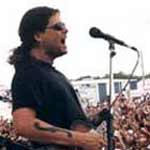 KNAC.COM: Just how good is life in Tesla right now?
KNAC.COM: Just how good is life in Tesla right now?
SKEOCH: I’ve got to say that it’s better than it has ever been. We are so much healthier and better than we were. We actually have conversations, and we aren’t all strung out on hard drugs real bad—maybe a little alcohol here and there—maybe a little smoking. We’re much, much better. I’m not trying to say that we aren’t dysfunctional in any way. We just do a lot better than we used to, and we’ve done a lot better since we got back together. I never thought we’d ever get back together, much less make one of our better records.
KNAC.COM: I’ve heard that a million times too, and it is probably only true in about 30% of the cases—with you guys though and this album though—it really is true.
SKEOCH: Thanks. That’s a common response for a guy in a band to have though because you just get so excited. I’ve said that and heard it before too, but I genuinely feel that way in my heart this time. I am really proud of it.
KNAC.COM: Was it a surprise when the record debuted as high on the charts as it did?
SKEOCH: Yeah, it was thirty-one or something. We really didn’t know what to expect. I mean, we knew that we had done our best and that we loved what we created. That’s really important for us. Me, personally, yeah, I would say I would have to have been surprised for it to debut as a top forty record. It’s been selling well, and we do more than half the record live. The fans are all out there singing the new songs.
KNAC.COM: That might have something to do with the fact that the songs are actually worth singing along with.
SKEOCH: We really try hard. We spend more time song writing or deliberating on songs than we do recording them. The songs are the core. That’s the real important thing.
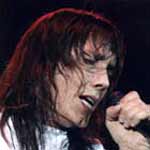 KNAC.COM: Let’s take the lyrics for “Caught In a Dream” which is undeniably a memorable tune, but if you were a cynic, you’d have to think, “are these guys putting me on?” Are these sentiments you truly believe in?
KNAC.COM: Let’s take the lyrics for “Caught In a Dream” which is undeniably a memorable tune, but if you were a cynic, you’d have to think, “are these guys putting me on?” Are these sentiments you truly believe in?
SKEOCH: Absolutely we do. Jeff wrote most of that song and the lyrics for the most part. You listen to a lot of Tesla songs from the past like “What You Give” and other things we’ve touched on, and that’s just straight from his heart. Yeah, and we actually do mean it. Wouldn’t it be a better world if we could live like that? Not that it would ever happen! It is a nice thought though and a beautiful song.
KNAC.COM: How much of a ‘60s type vibe do you think the band hearkens back to when writing music?
SKEOCH: I think influences just kind of float in from wherever. I know all five of us in the band are influenced by ‘60s and ‘70s type music and the ‘80s to a large extent really. There are also things that inspired us from ‘95 when we broke up until we got back together a few years later. For me when a band like Marilyn Manson comes out—who I just love, I love their messages because it touches my heart because it is a lot about how I feel about society. I can’t speak for the rest of the band, but that stuff influences me even now. That stuff influences me, and that stuff wasn’t even out before we broke up, and if it was, it wasn’t very popular at that point. Sure, the ‘60s are there though too-- The Beatles, for example.
KNAC.COM: The interesting part of Tesla though is that you have remained a rock band. Period.
SKEOCH: Yeah, we’re a rock band, and that’s one thing we wanted to do with this record. We wanted to be true to who we are and keep our identity, but not really be dated. We do get diverse sometimes, and we do some pop songs, but we can still get down, turn it up and crank out the noise sometimes.
KNAC.COM: Do you think people associate Tesla with excess as much as they might with other bands of that decade?
SKEOCH: No, but you know, I grew up wanting to be a rock and roll rebel and acting like one, and I finally became one. I became what I acted. Yeah, we weren’t excused from that. I don’t think people associated us with it, but yeah, it was definitely there.
KNAC.COM: When was the first time you realized that being in rock definitely comes with its perks and that they were starting to be pretty good?
SKEOCH: Well, you can get caught up in your ego which for me personally is really bad.
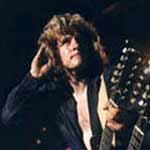 KNAC.COM: Are people guilty of enabling you to behave that way?
KNAC.COM: Are people guilty of enabling you to behave that way?
SKEOCH: Yeah, people change in the way they treat you, but at the same time there is more good than bad that comes with it. There are things that happen though over the course of time that cause you to think that you’re indestructible or that it could go on forever because you’re on such a high. I’ve got to say that when we broke up in ’95 that it kind of slammed us on down and made our humility a lot better to where I think we are in a better headspace than we were after that first record. We are much more realistic, and I feel better. Yeah, I suppose it was like that back then. It was definitely a high—I’ll give you that.
KNAC.COM: Is it too much to ask any twenty-year-old to handle all the fame, money and women that came with being in a successful rock band in the ‘80s?
SKEOCH: Absolutely. I’m sure it affected all of us, but that being said, I think that we all handled it pretty well. There may have been a couple of us though that had some problems. I don’t exclude myself. It was hard to a certain extent, but I think we did better than a lot of other bands in that position.
KNAC.COM: The fact that you guys are still here and have created one of your better albums has to feel extremely good.
SKEOCH: It is very validating because who knows how I’d feel if we hadn’t put this record out or gotten back together. The fact that we have is so amazing and wonderful.
KNAC.COM: How much of a lost period was it for you after the breakup? Did you feel as though you lacked direction?
SKEOCH: Well, yeah, and it was a bad breakup. I had a lot of anger towards the band, and there was a lot of other stuff going on. Yeah, me and Jeff ended up putting a band together. We did that for a while, but yeah, it was hard to find direction. I think we knew where our best magic was—it’s no wonder we all found each other the way we did. It was tough. Not being together was tough. It was like I didn’t know what I was doing. There was some getting along issues though that I was just pissed about—me personally. We can talk about those things openly now though because we communicate. We go to therapy, and we’re just taking care of ourselves better. We’re a business now, and we realize that. We aren’t twenty-year old kids anymore—I’m forty-two years old. We work hard.
KNAC.COM: When you look out from the stage, and you’re playing music—what is the biggest difference?
SKEOCH: It’s just better. We’re playing better, and we get along better. Other than that, the only difference is that there might be a few less people in smaller buildings. It’s really great and better than before. There really have been a lot of people though who have been waiting for us to get back together again. We did, and I tell you—they come out, and they sing the songs. It’s great to have new blood out there. It’s great to have more than half of the songs on your set be new and have people in the audience singing those as well.
KNAC.COM: A lot of bands attempt to play half the music from their latest work.
SKEOCH: It can’t always happen.
KNAC.COM: Yeah, and when the new record isn’t up to par, the audience can get kind of impatient.
SKEOCH: I’ve been doing this set on tour for two legs now, and I can tell you that it totally does work. We haven’t had one bad criticism about it. It’s been great.
KNAC.COM: Do you think that kids growing up today are missing out on the whole atmosphere that existed during that time with regard to kids wearing rock t-shirts and identifying with a whole scene?
SKEOCH: I still see that to an extent at our shows. You know, people come and they’re into it, and they’re wearing the merchandise.
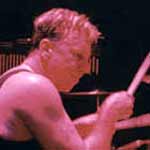 KNAC.COM: But you guys are part of a select few though who are still successful—do you think that as a whole the young fans of today have a quality grouping of bands that they can identify with?
KNAC.COM: But you guys are part of a select few though who are still successful—do you think that as a whole the young fans of today have a quality grouping of bands that they can identify with?
SKEOCH: I don’t know. That is a hard question to answer. I don’t go out and see a lot of bands right now. I go out and do our business, and I listen to a lot of records, but I also have a family. When I was growing up during the late ‘70s and early ‘80s, there were just some tremendous shows that I saw.
KNAC.COM: What specifically has stuck in your mind?
SKEOCH: They would have these shows at Oakland Stadium called “Day On The Green.” They were just great stadium shows. I saw Van Halen on their first tour there. I saw AC/DC with Bon Scott. I just saw some crazy shows there. During that time, I also saw Judas Priest and U.F.O. Maybe the reason they stood out for me was that I was just so influenced by these bands. It just stands out for me. Nowadays, I don’t know. Again, Marilyn Manson puts on a great show. I gotta believe that people are still doing their jobs and entertaining.
KNAC.COM: So, you’re saying it just might look a little different.
SKEOCH: Yeah, yeah. It just might look a little different. I think kids are still going out and enjoying music.
KNAC.COM: What is the advantage of playing with the Scorpions versus going out on your own?
SKEOCH: Well, the money is about the same, but you get to be seen by two to three times as many people.
KNAC.COM: What does it do to the size of your set list?
SKEOCH: It shortens it a little. We’re doing about an hour and ten minutes right now. The Scorpions are being really generous—they’re sweet guys.
KNAC.COM: Like Queensryche or the Scorpions or any number of bands from that era, you have to be seeing a multigenerational audience. I’m sure that type of longevity is something you could never have envisioned.
SKEOCH: The way life just twists and turns, you never know what is going to happen. It’s been quite an interesting life that I never could have imagined.
KNAC.COM: What do you think is the primary reason Tesla is still around and playing respectable venues on a quality bill while so many aren’t?
SKEOCH: I think as far as bands from our era go, we came out of that era with a lot more integrity than a lot of other bands. I’m not trying to sound pompous or that my ego is inflated, but I just believe that. Our first record came out in ‘86, and we ended up breaking in ‘95, but I just think that our records have stood up over time. There is some dated material there, but I just think that as a whole, our records have stood up well. We were just more of a timeless band. If you listen to say, Look What The Cat Dragged In by Poison, now it’s very dated. Whereas, you can listen to a song like “What You Give” or even a song off our first record like some of the bluesier rock tracks and it holds up. I think that’s what it is.
KNAC.COM: So you think that is how Tesla avoided getting lumped in with bands like Winger?
SKEOCH: Yeah, that’s what I’m saying. We just came out with a lot more integrity. People tried to put us in that spot sometimes. They would mention us in that time too, but we are often set apart from a lot of that. I think that is what has made it possible for us to be sitting here and talking about it right now.
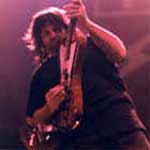 KNAC.COM: Do you think that part of the reason for that is you didn’t have chicks with eight feet of hair humping the top of sports cars? Not that there is anything wrong with that---
KNAC.COM: Do you think that part of the reason for that is you didn’t have chicks with eight feet of hair humping the top of sports cars? Not that there is anything wrong with that---
SKEOCH: Yeah, we consciously avoided that stuff back then.
KNAC.COM: Really? You were aware of the impact?
SKEOCH: Absolutely. We thought a lot of that was silly. As a matter of fact, one of the last videos we did off the Bust A Nut record before we broke up was called “Need Your Lovin’.” Basically, it was a spoof on all those types of videos—it was making fun of it. To us, it was silly, and yes, we were very conscious of those things back then.
KNAC.COM: Was there also a conscious decision to not try to throw out a half a dozen power ballads?
SKEOCH: Well, yeah. You know, to us it just always came back to the songs. The songs are so important. Songs are it. We definitely wanted to just write great songs and not do exactly what it is that you’re talking about. We’re real lucky that all five of us are on the same page that way. We can all just kind of look at each other and know if it’s corny or it’s working or whatever.
KNAC.COM: Was there any external pressure to kind of go with the scene a little bit more?
SKEOCH: No, I mean we individually may have felt some need and took on the looks of some of the other bands a little bit, but collectively I don’t think that was an issue. We just kind of did our own thing. We’ve always been about putting our pants and our boots on for the day and just walking up onstage that way too. It’s not like you’re making a change for the audience. It’s more of that vibe.
KNAC.COM: Was one of the definite high points of your career the Alice Cooper tour where Tesla opened up for him shortly after the release of Mechanical Resonance?
SKEOCH: That’s right. Back then, we were working so hard. When you ask me some of these questions about the past, man, it’s just all not a total blur, but we were up there working and doing it, and a lot times, you didn’t have time to think about it. It’s more in retrospect that you think about that stuff. Alice has a radio show in Phoenix, and we went on with him, and we were talking about this very tour. He is such a sweet guy, and after the interview, I was just like, “Alice is a cool guy.” It was only after that interview that I could sit back and think about what a cool time that was. I guess it’s different for everybody, but that was kind of my experience.
KNAC.COM: Most people don’t realize what kind of hours you have to put in to make something like this work either.
SKEOCH: Man, I hope my wife reads this interview because she doesn’t think I work at all. I’m tellin’ ya that when a record comes out, you are just slammed between the press, shows and meet and greets. I wouldn’t have it any other way though because I love it, but it can be stressful. We do love this, and it is our life. All five of us grew up rockin’, and this is all I’ve ever done. I’ve never done anything else in my life.
KNAC.COM: You were on VH-1’s 100 Greatest Metal Moments show as well—how was that? Did it make you think back?
SKEOCH: Oh yeah, I’m on it every night. I’m a TV star now. The first two episodes I thought I looked like Cousin It, and I was just kinda mumbling, so I wasn’t too pleased. The last three segments, I actually got to talk a lot, and actually felt kind of intelligent.
KNAC.COM: Really?
SKEOCH: Yeah, I was happy with my personal self, and I think as a band, I think we did good. There were two different interview segments, and one had me, Brian and Frank. The other had Jeff and Troy. They show us on every segment. It is a good kind of push for us. It’s like, “Oh, there’s those Tesla guys.” Aside from us even, the show is really entertaining. I saw all five segments. I thought it was a good show.
KNAC.COM: Did you find yourself having to not say something that might have been construed as negative about another band?
SKEOCH: When we left that interview, I was actually proud of us because we don’t like to usually say anything negative about any other band. On that day though, we weren’t really taking any punches at other bands, but we were just sort of being honest and saying how we feel. When it was all edited and everything, I don’t think we came off bad at all. I’m very happy about that. We were honest this time—we didn’t even really say anything negative about anybody.
KNAC.COM: You didn’t want to relive the whole Quiet Riot thing?
SKEOCH: We love rock and roll. Even some of these bands that we would say something about… at this point there is no reason to even go there really. I’m just happy we were honest on that show, and the way they edited it, it came out just great.
KNAC.COM: One of the moments you guys commented on concerned the area underneath the stage during the ‘Hysteria’ Tour with Def Leppard. How intimate was your personal knowledge of that area?
SKEOCH: Totally. The Def Leppard tour was so much fun. We were still touring on our first record, and it was great. The stuff underneath the stage was just the tip of the iceberg. We learned so much from them about just being a rock band and just how to treat other people and how to conduct ourselves. As a band, we have just always tried to keep that in mind. Throughout the years, I believe we’ve been able to keep our ideals and integrity in check.
TeslaTheBand.com




